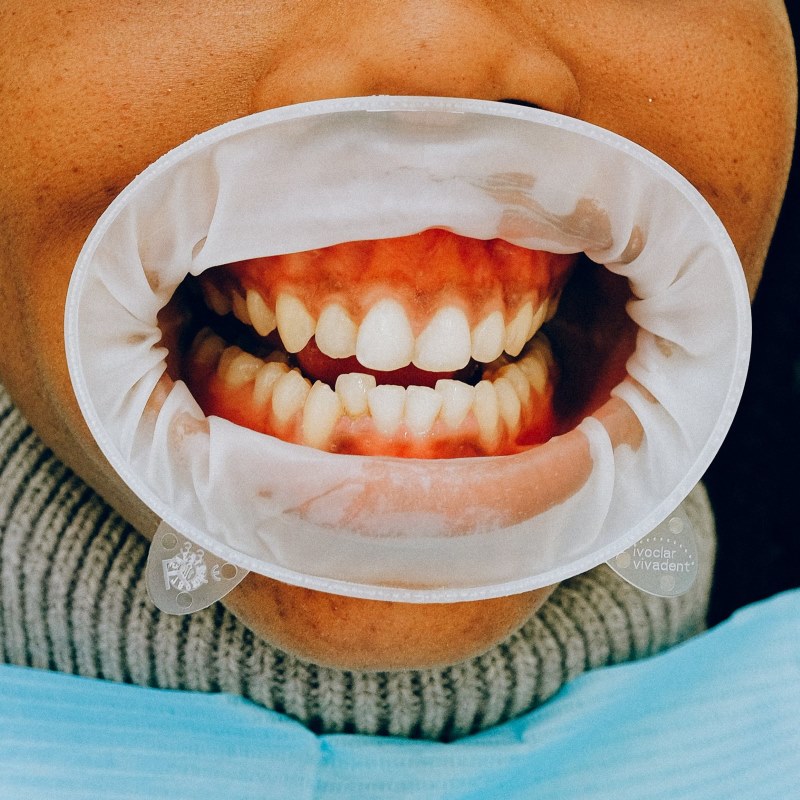Dec
12

There’s no question about it – there’s something deeply unsettling about spitting your toothpaste into the sink and seeing tinges of red in there. But is spitting blood after brushing always something to worry about? While seeing red in the sink can indicate underlying dental and health issues, it’s not always a cause for panic. In the following blog, we’re going to take a look at some common causes of bleeding while brushing, remedies, and when you should see a dentist. Let’s dive in.
Common Reasons for Blood While Brushing
Gingivitis and Gum Inflammation
Gingivitis is an early stage of gum disease, and is one of the most common causes of bleeding gums. Gingivitis often occurs as the result of poor oral hygiene, leading to plaque buildup along the gum line; this plaque then harbours bacteria that can infect and inflame the gums, causing them to bleed during brushing. This stage is often painless, which can make it easy to ignore.
However, early intervention is absolutely key here. If left untreated, gingivitis can progress to more serious forms of gum disease – some of which can even cause tooth loss – so if you are experiencing gingivitis symptoms, paying a visit to our award-winning clinic in London can help you get your oral health back on the right track. While it can be alarming to discover that you have early-stage gum disease, gingivitis is usually reversible with proper dental care and improved oral hygiene.
Aggressive Brushing or Improper Technique
Another frequent cause of bleeding gums is aggressive brushing or using an improper technique: brushing teeth should be a gentle process, and brushing too hard or using a toothbrush with stiff bristles can irritate and damage delicate gum tissues, leading to bleeding and irritation. It’s important to always use gentle strokes and a soft-bristled toothbrush to avoid gum trauma: failing to do so not only leads to bleeding but can also wear away at the protective enamel that covers your teeth, which can end up leading to further oral health issues down the line.
Periodontitis and Advanced Gum Disease

Circling back to gum disease – if gingivitis isn’t treated promptly, it can often advance to periodontitis, which is a more severe form of gum disease with more dramatic consequences for your oral health. This stage of gum disease can involve the gums pulling away from the teeth, forming pockets that become infected, sensitive, and inflamed. Knowing how to treat swollen gums can help manage this condition effectively.
The body’s immune response – combined with bacterial toxins – starts to break down the bone and connective tissue that hold teeth in place, and this can lead to more significant bleeding, pain, and even tooth loss.
Other Potential Causes
It’s also worth noting that bleeding gums can equally be a symptom of other health issues, such as vitamin deficiencies, hormonal changes (as seen in pregnancy), certain medications, and more serious conditions like diabetes or blood disorders. If your dentist doesn’t see anything wrong with your teeth or gums, it’s a good idea to evaluate your symptoms further and try to get to the root cause of your gum bleeding.
Being aware of the warning signs of gum disease is crucial for early detection and treatment.
Seeking Professional Evaluation
If you experience bleeding while brushing more than once, we highly recommend that you professional evaluation with a trusted and qualified dentist. At Smile Cliniq, we’ll always perform comprehensive and thorough examinations to get to the root cause of your gum bleeding and provide an appropriate treatment plan for your needs. Remember, timely intervention can prevent more serious dental and health issues down the line, so don’t make excuses to put off your appointment – delaying treatment can often result in more expensive dental visits down the line.
FAQs
Is it normal to spit blood when brushing my teeth?
No, spitting blood when brushing isn’t normal, and is often a sign of gingivitis or other gum problems. It’s important to go for a dental evaluation to determine the cause and appropriate treatment if it becomes a recurrence when brushing.
Can aggressive brushing cause my gums to bleed?
Yes, aggressive brushing or using a hard-bristled toothbrush can irritate and damage your gums, leading to bleeding. Switching to a soft-bristled brush and using gentle strokes is recommended.
What is the difference between gingivitis and periodontitis?
Both gingivitis and periodontitis are types of gum disease; gingivitis is the early stage of gum disease – characterised by inflammation and bleeding of the gums – while periodontitis is a more serious condition where gums pull away from teeth, forming infected pockets and potentially leading to tooth loss.
Should I stop brushing if my gums bleed?
No, you should not stop brushing if your gums bleed! Instead, switch to a softer toothbrush and gentler technique; continuing to brush and floss regularly is essential for your oral health, and stopping could worsen any ongoing dental issues.
Can a vitamin deficiency cause bleeding gums?
Yes, deficiencies in vitamins, particularly vitamin C, can lead to gum bleeding and other oral health issues. This is why it’s always important to maintain a balanced diet and seek advice from your GP if you suspect a deficiency.










